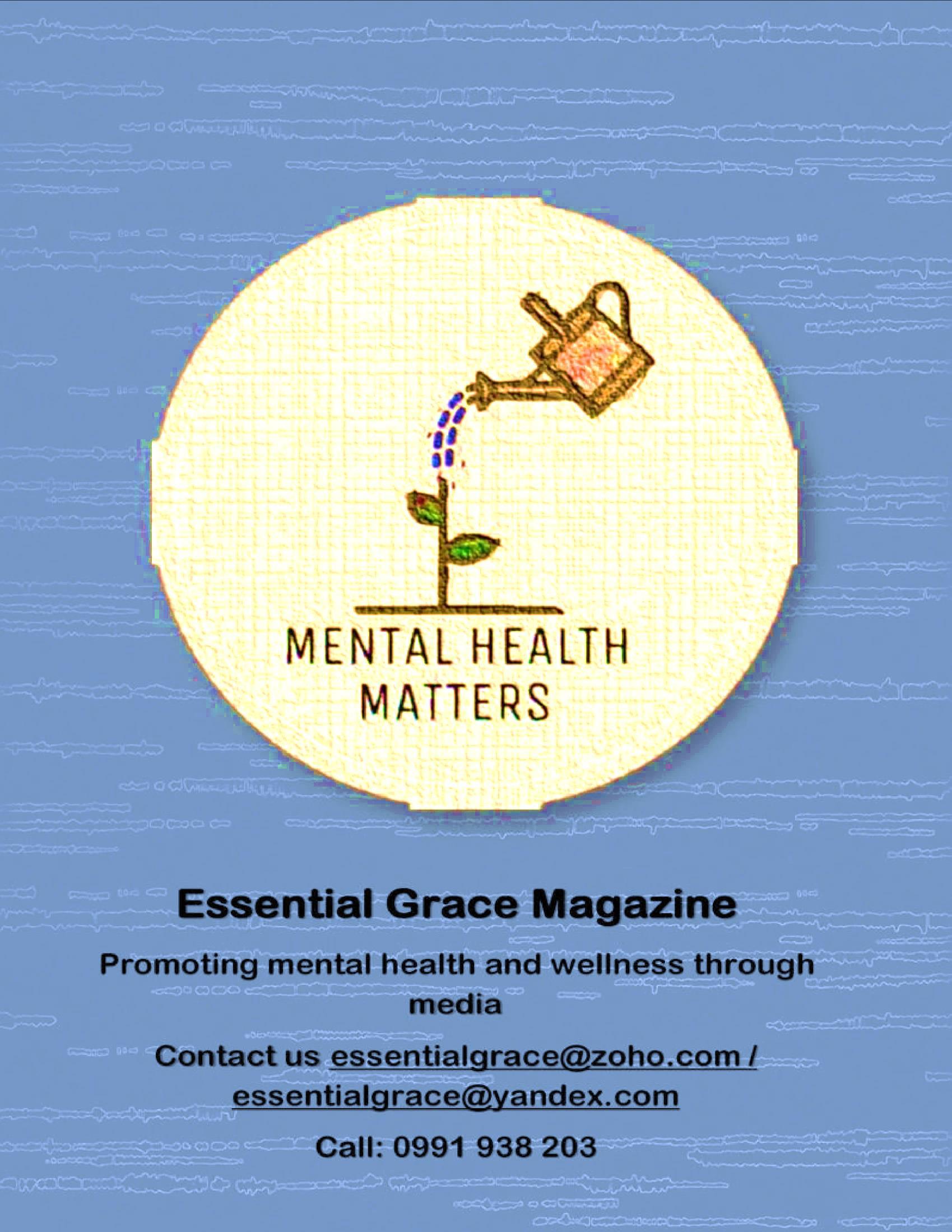

Mental Health and Wellness April 2023 Vol. 3 Issue 9
Essential Grace Magazine
April is Stress Awareness month around the world. What is stress? What does stress look like for you, and how do you deal with it? Let’s find out more in this issue!




2 | Essential Grace Magazine April 2023












3 | Essential Grace Magazine April 2023 Did you know … Most of our editorial content is contributed by our readers. We welcome your ideas, articles, questions, images, and feedback. Submit your content to the editor at essentialgrace@zoho.com Essential Grace is a free online publication that is focused of promoting mental health and wellness in Malawi and around the world. Follow and subscribe to the magazine at www.issuu.com/essentialgrace follow, like, and share on our social media platforms; @EssentialGraceMagazine @essentialgracemagazine.mw 0995 147 290 Comments and feedback on any of our content can be addressed to essentialgrace@zoho.com
Hello, dear reader!
How are you holding up this month? Did you know that April is stress awareness month? That means it’s the perfect time to take a good look at your life and see what’s stressing you out. And don’t worry, we’re not here to judge. We know that some stress can be good for you, as long as it doesn’t overwhelm you or harm your mental health. But we also know that as the weather gets colder and the days get shorter, many people struggle with mood swings, sadness, depression, anxiety, loneliness, and even addiction. That’s why we want to help you get ready for the winter blues and beat them before they beat you. How? By reading our article on Seasonal Affective Disorder (page 24) where you’ll find tips and tricks on how to cope with the seasonal changes and stay happy and healthy. Don’t miss it!
We continue to provide advice on accessing mental health recourses. Along with knowing how to find a good therapist, you need to know how to identify both red and green flags from your counsellor. Check out the article from page 19 to know more.
Please make use of our contact lists provided throughout this magazine. If you would like to be included as a mental health worker, contact the editor to submit your details.
Want to get in touch? You may do so through our social media pages or directly to the editor through essentialgrace@zoho.com
Happy Reading!
Julie Soko (ManagingEditor)
4 | Essential Grace Magazine April 2023
The Stress Management Society initiated the Stress Awareness Month in 1992, which is now observed annually during the month of April. The primary objective of this yearly event is to create awareness about the reasons behind stress and ways to alleviate its negative impact. The theme for this year is "Community," emphasizing the significance of providing assistance and compassion to those who require it, given the challenging circumstances over the past few years.

5 | Essential Grace Magazine April 2023
This is a familiar sight for those in the southern and some central parts of Malawi as the harvesting of maize has begun.

For some it is a bittersweet time as they have lost entire fields of maize to flood waters, droughts, or thieves. For others it is a time to celebrate the effort of their labour.
We are living in very uncertain times; let us all remember to look after the food we have while we have it.
6 | Essential Grace Magazine April 2023
What is Stress and How Does It Affect Us?
Stress is a state of worry or mental tension caused by a difficult situation. When we face a stressful event, our body releases chemicals and hormones that prepare us to fight or flee from the danger. This can help us survive in life-threatening situations or cope with short-term pressures.
However, not all stress is helpful. When stress becomes frequent or chronic, it can harm our physical and mental health. Chronic stress can weaken our immune system, increase our blood pressure, cause headaches, insomnia, anxiety, depression, and other problems.

7 | Essential Grace Magazine April 2023
There are different types of stress depending on the source, duration, and intensity of the stressor. Some of the common types of stress are:
Acute stress: This is the most common type of stress that occurs when we face a short-term challenge or threat. For example, when we have an exam, a deadline, or an argument.
Episodic stress: This is the type of stress that occurs when we experience frequent or repeated episodes of acute stress. For example, when we have a hectic lifestyle, multiple responsibilities, or constant worries.
Chronic stress: This is the type of stress that occurs when we face a long-term or persistent challenge or threat. For example, when we have a serious illness, financial problems, or an abusive relationship.
Stress can affect us in different ways depending on our personality, coping skills, social support, and resilience. Some people may be more vulnerable to stress than others. Some people may find certain situations more stressful than others. Some people may cope with stress better than others.
The key to managing stress is to recognize its signs and symptoms and to seek help when needed. Some of the common signs of stress are:
Physical: headaches, muscle tension, fatigue, insomnia, digestive problems, etc.
Emotional: anxiety, irritability, sadness, anger, mood swings, etc.
Behavioral: overeating, undereating, smoking, drinking, procrastinating, etc.
Cognitive: difficulty concentrating, memory problems, poor judgment, negative thoughts, etc.
There are many ways to cope with stress effectively and healthily. Some of them are:
Relaxation techniques: breathing exercises, meditation, yoga, massage, etc.
Physical activity: walking, jogging, cycling, swimming, dancing, etc.
Social support: talking to friends, family members, counselors, or support groups.
Hobbies: reading, writing, painting, gardening, etc.
Positive thinking: reframing situations, expressing gratitude
8 | Essential Grace Magazine April 2023
Black Africans face unique stressors that harm their mental health.

They need more awareness, support, and care to cope and heal.

9 | Essential Grace Magazine April 2023
How Stress Affects Black People, Especially in Africa
Stress is a natural human response that helps us cope with challenges and threats in our lives. However, when stress becomes frequent or chronic, it can harm our physical and mental health. Chronic stress can increase the risk of heart disease, obesity, diabetes, depression, anxiety, and other problems.
Black people, especially in Africa, may face more stress than other groups due to various factors such as poverty, discrimination, violence, environmental hazards, and lackof access to quality health care. These factors can create a cumulative biological burden on the body, known as allostatic load, which can accelerate aging and increase the risk of illness and death. Some of the common sources and effects of stress for Black people in Africa are:



Poverty: According to the World Bank, more than 40% of the population in sub-Saharan Africa lives below the poverty line of $1.90 per day. Poverty can create stress by limiting access to basic needs such as food, water, shelter, education, and health care. Poverty can also expose people to more environmental stressors such as pollution, noise, crowding, and natural disasters.
Discrimination: Black people in Africa may face discrimination based on their ethnicity, religion, gender, sexual orientation, or disability. Discrimination can create stress by undermining self-esteem, social support, and opportunities for advancement. Discrimination can also trigger negative emotions such as anger, fear, sadness, and resentment.
Violence: Black people in Africa may experience violence from various sources such as armed conflicts, civil unrest, crime, domestic abuse, or terrorism. Violence can create stress by causing physical injuries, psychological trauma, grief, and loss. Violence can also disrupt social networks and community cohesion.
Health disparities: Black people in Africa may suffer from health disparities due to various factors such as genetic susceptibility, environmental exposure, behavioral risk factors, and lack of access to quality health care. Health disparities can create stress by affecting physical and mental well-being, quality of life, and life expectancy.
10 | Essential Grace Magazine April 2023
How Stress Presents Differently in Males vs Females
Stress can affect both males and females, but there may be some differences in how they experience and respond to stress. Some of the factors that may influence these differences are biological, psychological, and social.
Biological factors
Hormones: One of the main hormones involved in stress is cortisol, which is released by the adrenal glands in response to a stressful situation. Cortisol helps the body mobilize energy and prepare for action. However, too much cortisol can have negative effects on the body and the brain. Studies have shown that females tend to have higher levels of cortisol than males in response to stress, which may make them more vulnerable to its effects.
Brain structure: Another factor that may affect how males and females respond to stress is the structure and function of the brain. Studies have shown that some brain regions involved in emotion regulation, such as the amygdala and the prefrontal cortex, may differ between males and females in size, connectivity, and activity. These differences may influence how males and females process and cope with stressful emotions.
Genetics: A third factor that may affect how males and females respond to stress is genetics. Studies have shown that some genes that are involved in the regulation of stress hormones or neurotransmitters may differ between males and females in expression or function. These differences may influence how males and females react to stress at a molecular level.
Psychological factors

Emotions: One of the psychological factors that may affect how males and females respond to stress is emotions. Studies have shown that females tend to report more negative emotions such as sadness, anxiety, and fear than males in response to stress. Females may also be more likely to ruminate or dwell on their negative emotions than males. These emotional responses may affect how females cope with stress and their health outcomes.
Coping strategies: Another psychological factor that may affect how males and females respond to stress is coping strategies. Studies have shown that females tend to use more emotion-focused coping strategies than males in response to stress. Emotion-focused
11 | Essential Grace Magazine April 2023
coping strategies involve managing or reducing negative emotions through methods such as seeking social support, expressing emotions, or avoiding the problem. Males tend to use more problem-focused coping strategies than females in response to stress. Problemfocused coping strategies involve solving or changing the stressful situation through methods such as planning, taking action, or seeking information.
Social factors
Social roles: One of the social factors that may affect how males and females respond to stress is social roles. Studies have shown that females tend to have more multiple and conflicting social roles than males, such as being a mother, a wife, a worker, a caregiver, etc. These multiple roles may create more sources of stress for females than males. Females may also face more discrimination or harassment based on their gender than males. These social factors may affect how females perceive and cope with stress and their health outcomes.
Social roles: One of the social factors that may affect how males and females respond to stress is social roles. Studies have shown that females tend to have more multiple and conflicting social roles than males, such as being a mother, a wife, a worker, a caregiver, etc. These multiple roles may create more sources of stress for females than males. Females may also face more discrimination or harassment based on their gender than males. These social factors may affect how females perceive and cope with stress and their health outcomes.
Social support: Another social factor that may affect how males and females respond to stress is social support. Studies have shown that females tend to seek more social support than males in response to stress. Social support can be beneficial for reducing stress and improving health by providing emotional comfort, practical help, or information. However, social support can also be a source of stress if it is inadequate, inappropriate, or conflicting These social factors may affect how males and females use and benefit from social support in times of stress.
Stress can affect both males and females in different ways depending on various biological, psychological, and social factors. These factors may influence how they experience and respond to stress, as well as how stress affects their health and well-being. Understanding these differences can help males and females recognize their own stress patterns and find effective ways to cope with stress.
12 | Essential Grace Magazine April 2023
Mental Health Professionals in Northern Malawi
St John of God Hospitaller Services
01311690 / 01311495




John Banda (Psychosocial Counsellor)
Moyale Barrakcs
0994 434 012
johnalickbanda05@gmail.com

Precious Chipeta (Psychosocial Counsellor)
0886 687 857
kanyakulapreciouschipeta@gmail.com
Buxton Shaba (Psychosocial Counsellor)
CEO Youth Mental Health Warrior. Mzuzu Katoto
0996 560 666
William Mackson Phiri 0881 072 623
Justina Msofi (Psychosocial Counsellor)
Luwinga Secondary School
0888 505 043
jasstinamsofi@yahoo.com
Jimmy Kambalame
Lighthouse Trust, Central Hospital. Mzuzu
0999 944 899
13 | Essential Grace Magazine April 2023
Some of the general tips for managing stress are:
Identify the sources of stress and try to reduce or eliminate them if possible.
Practice relaxation techniques such as breathing exercises, meditation, yoga, or massage.







Engage in physical activity that you enjoy and that suits your fitness level. Seek social support from friends, family members, counselors, or support groups.
Express your emotions in healthy ways such as talking, writing, or art.
Avoid unhealthy coping behaviors such as smoking, drinking, overeating, or undereating.
Maintain a balanced and nutritious diet that includes fruits, vegetables, whole grains, lean protein, and healthy fats.
Get enough sleep and rest to recharge your body and mind.
Seek professional help if you feel overwhelmed by stress or if it affects your daily functioning.
Stress is a part of life, but it does not have to control your life. By understanding how stress affects you and finding healthy ways to cope with it, you can improve your quality of life and your health. Remember that you are not alone and that there are resources and people who can help you. You deserve to be happy and healthy.
Are you feeling overwhelmed or hopeless?
If you're feeling weighed down by your stress and feel like there's no way out, it may be time to seek help. A therapist can provide you with support, guidance, and tools to help you manage your stress and regain a sense of control over your life.
Please make use of the contact information provided to find a therapist near you
14 | Essential Grace Magazine April 2023
Managing Stress
The following article was submitted by Mr William Mackson
 Phiri.
Phiri.
A professional working in Education at Chibavi Secondary School, Mzuzu. He is a passionate mental health worker and motivational speaker, and organizational development manager. Contact him 24/7 through the number below:
0881 072 613



CAUSES OF STRESS
Stress is a state of worry or mental tension caused by a difficult situation. People experience stress in different ways and for different reasons. The reaction is based on your perception of an event or situation. If you view the situation negatively you will feel distressed – overwhelmed, oppressed or out of control. Distress is the more familiar form of stress. The other form, eustress, emanates from a positive view of an event or situation, which is why it is called “good stress”
Eustress helps you rise to a challenge and can be an antidote to boredom because it engages focused energy. That energy can easily turn to distress, however, if something causes you to view the situation as unmanageable or out of control. A positive stressor for one person can be a negative stressor for another. Stress can either be acute, episodic or chronic.
The causes of stress fall into three main categories and these are: the unsettling effects of change, the feeling that an outside force is challenging or threatening you and the feeling that you have lost personal control.
Life events such as marriage, changing jobs, divorce, loss of life and property due to natural disasters like cyclone Freddy or death of a relative or friend are the most common causes of stress. Although life threatening events are less common, they can be the most physiologically and psychologically acute.
15 | Essential Grace Magazine April 2023
Symptoms of stress fall into three general, but interrelated categories which are physical, mental and emotional. The most common symptoms of distress are headaches, fatigue, gastrointestinal problems, hypertension (high blood pressure), heart problems such as palpitations, inability to focus or lack of concentration, sleep disturbances (sleeping too much or an inability to sleep), sweating palms or shaking hands, anxiety and sexual problems.
Even when you don’t realize it, stress can cause or contribute to serious physical disorders. It increases hormones such as adrenaline and corticosterone, which affect your metabolism, immune reactions and other stress reactions. This can lead to increase in your heart rate, respiration, blood pressure, and physical demands on your internal organs.
Behavioral changes are also expressions of stress. They include irritability, disruptive eating patterns (overeating or under eating), harsh treatment of others, increased smoking or alcohol consumptions, isolation, compulsive shopping among others.
A sustained high level of stress is no laughing matter. It affects every area of your life – productivity in the workplace and classroom, increased health risks, and relationships.
HOW TO MANAGE STRESS
The first step is understanding yourself better – how you react in different situations, what causes you stress, and how you behave when you feel stressed. Having done that, set priorities, practice facing stressful moments, examine your expectations by setting realistic goals, live a healthy lifestyle by getting plenty of exercises, eating healthy foods and allowing time to rest and relax. In addition, learn to accept change as a part of life by being cognizant of the fact that nothing stays the same. Develop a support system of friends and relatives you can talk to when necessary. Believe in yourself and your potential. Remember that many people from disadvantaged backgrounds have gone on to enjoy great success in life.
Further to that, avoid activities that promise release from stress while actually adding to it. Drinking alcohol, drinking caffeine, smoking, using narcotics
16 | Essential Grace Magazine April 2023
(including marijuana), and overeating all add to the body’s stress apart from their other harmful effects.
Other strategies include scheduling time accordingly, arrange for uninterrupted time to accomplish tasks that need your concentration, arrange some leisure time during which you can do things that you really enjoy, avoid scheduling too many appointments, become an expert at managing your time, read books, reviews, watch videos, and attend seminars on time management. Once you cut down on time wasters, you will find time to recharge yourself.
Learn to say “no”. Setting limits can minimize stress. Spend time on your main responsibilities and priorities rather than allowing other people’s priorities or needs to dictate how you spend your time. Exercise regularly to reduce muscle tension and promote a sense of well-being. Tap into your network. Family, friends, and social groups can help when dealing with stressful events.
Unfortunately, failure to manage stress may lead to clinical depression; a mental illness that affects a person’s body, mood and thought and may cause people to lose interest in daily life, may complicate other medical conditions, and may even lead to suicide. Love yourself more by managing stress and living a healthy life!
Tofindoutmore,pleasecontact Williamthroughthenumber provided,orreachouttooneofthe mentalhealthproviderslisted.

17 | Essential Grace Magazine April 2023
Mental Health Professionals in Central Malawi
St John of God Hospital Area43,offUfuluRoad
0992460253/0992460254




Tamanda Msasata Tee Therapy Consultancy Service
0999419898/0888553756
Info.teetherapy@gmail.com
Irene Hora (Chief Consultant)
IntegratedProfessionalCounsellingandAdvisoryLtd

0992598595
Brighton Lupeska Kawale Health Centre 0996750057Jbryto20@gmail.com
Elizabeth Nkhonjera 0996 293 804
Guidance and Counselling Association of Malawi (GCAM) 0995142328/0888448108
Likuni Hospital 0996383202/0992556138
Phunzi Counselling (Area18)0999365871
Prime Health 0995482905
Joseph Majid Lungu (Psychotherapist)0888378035
He Matters Foundation 0997071657
Harm Reduction Awareness Counselling and Testing Services
0999317529
Friends of Hope 0994781044
Youth Wave 02122280999204068
Moses Kachingwe 0881 569 863 / 0997 542 704
18 | Essential Grace Magazine April 2023
Suicide Prevention
(Mponela) 0888 114 626 / 0999 299 770 / 0884 467 846
Group
As more people are beginning to access mental health services around the world, it is important to know how to find a good therapist.
Not only that, but to recognize the red and green flags in your therapeutic relationship.


19 | Essential Grace Magazine April 2023
Red flags to be aware of when seeing a therapist








































20 | Essential Grace Magazine April 2023
Here are some signs that the therapist you are seeing is working in a professional and effective manner:
Professionalism: A good therapist should behave in a professional manner. They should be punctual, organized, and respectful. They should maintain clear boundaries and should not disclose personal information about themselves.
Empathy: A good therapist should be able to demonstrate empathy towards their clients. They should listen attentively to their clients' concerns, show compassion and understanding, and help them feel comfortable and supported.
Active listening: A good therapist should be an active listener. They should pay close attention to what their clients are saying, ask clarifying questions, and reflect back what they hear to ensure they fully understand their clients' concerns.
Collaborative approach: A good therapist should work collaboratively with their clients. They should encourage their clients to be active participants in the therapy process, and work with them to develop achievable goals and strategies for achieving those goals.
Evidence-based approach: A good therapist should use evidencebased approaches to treatment. They should be knowledgeable about the latest research in their field and be able to provide their clients with evidence-based treatments that have been shown to be effective for their specific concerns.



21 | Essential Grace Magazine April 2023
Green flags to be aware of when seeing a therapist

22 | Essential Grace Magazine April 2023
Your mental health is very important. Knowing when to get help, and recognizing the right mental health professional to help you is your responsibility to take. Make an informed choice.
Mental Health Professionals in the Southern Region of Malawi
Zomba Psychiatric Hospital 015 262 66
Limbika Maliwichi (Clinical Psychologist)
0993 662 154
Julie Soko (Consultant Psychologist)
0995 147 290
Prism Counselling and Consultancy (Zomba)
0998 933 273
Dr Chiwoza Bandawe. Harmony Counselling Centre
0888 200 222




Dr Precious Makiyi (Child & Adolescent Mental Health Professional)
0999 426 368
Accord Cognitive Counselling Services
0882 431 111
Vintage Health Wellness Centre (Namiwawa)
0995 260 153 / 0883 859 724

Blantyre Counselling and Therapies Centre
0996 299 888
Tilinao Lamba (Counselling Psychologist)
0885 795 906
Ruth Mkolesia (Counselling Psychology)
Seed of Hope 0993 110 993
Dr Alli Makalani
0888 611 127
Dr Mathero Nkhalamba 0884 20 34 34
23 | Essential Grace Magazine April 2023
Some people feel sad when the seasons change, especially when it gets darker and colder. This is called seasonal affective disorder (SAD) and it's a kind of depression. It usually happens in places where the sun doesn't shine much in winter, but it can also happen in African countries.
We don't know how many people in Africa have SAD, because it might depend on where they live and how they cope with it. Maybe people who live near the equator don't get SAD as much because the days are always about the same length. Maybe people who have strong family and community ties don't show their SAD as much.
The good news is that SAD can be treated with different things like bright lights, talking to a therapist, or taking pills. If you feel depressed when the seasons change, you should talk to someone who can help you feel better.

24 | Essential Grace Magazine April 2023
Differentiating SAD and Depression
Seasonal affective disorder is very similar to regular depression. Individuals with SAD may actually have more symptoms of depression than those who have been diagnosed with regular depression; however, these symptoms only occur seasonally. SAD is a milder form of a major depressive disorder.
One notable difference is that, with SAD, there will be times of the year where you can laugh and receive comfort and live a somewhat normal life. With depression, it can be tough to get enjoyment from anything or take part in your usual social activities.
Depression also often brings symptoms of body aches, feelings of worthlessness, and suicidal thoughts.
Some possible ways to deal with SAD are:
Use light therapy. This is when you sit near a special light box that mimics natural sunlight and helps your brain to make happy hormones. It can work in a few days or weeks and has few side effects¹.

Talk to a therapist. This is when you share your feelings and thoughts with a trained professional who can help you cope better and change your negative patterns. A type of therapy called cognitive behavioral therapy can be especially helpful for SAD¹.
Take medication. This is when you take pills that can balance your brain chemicals and reduce your depression symptoms. Some antidepressants can also prevent SAD from coming back¹.
25 | Essential Grace Magazine April 2023



26 | Essential Grace Magazine April 2023
One of the lessons that I grew up with was to always stay true to yourself and never let what somebody else says distract you from your goals.
Michelle Obama




By now, we hope you are aware that you can access mental health care from all the Central (Referral) Hospitals in the country.
Here is something to take note of, before you can get to the Central (Referral) Hospitals, you need to first visit your local District Hospital in order to be assisted. This applies to mental health care as well.
Once you have been assessed, the medical staff (a psychiatric nurse or clinician) will then determine whether you need to be referred to the Central Hospital, which also provides comprehensive care for mental health challenges.
Please take note of the list of District Hospitals available in Malawi.
Chitipa District Hospital
Karonga District Hospital
Mzimba District Hospital
Nkhata Bay District Hospital
Rumphi District Hospital
Dedza District Hospital
Dowa District Hospital
Kasungu District Hospital
Mchinji District Hospital
Nkhokota District Hospital
Ntcheu District Hospital
Ntchisi District Hospital
Salima District Hospital
Balaka District Hospital
Chikwawa District Hospital





Chiradzulu District Hospital
Machinga District Hospital
Mangochi District Hospital
Mulanje District Hospital
Would you like to advertise your mental health services with Essential Grace Magazine?
Get in touch with us for your free offer of mental health related advertising be it for counselling services, support groups, books, upcoming events, and wellness services (e.g. Fitness, massage therapy)

Mwanza District Hospital
Nsanje District Hospital
Phalombe District Hospital
Thyolo District Hospital
Zomba District Hospital
31 | Essential Grace Magazine April 2023

































































































